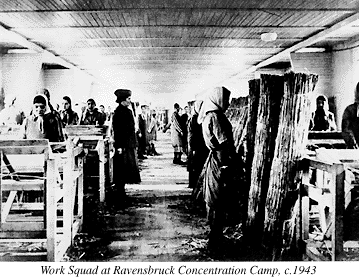
Some people who came to the camp, we called them "god-trees." They stayed in one place all day long, not moving, not eating, and slowly everything became mixed up in their heads. They had no feeling, no strength; they would ask others to do everything for them. You couldn't be that way and survive.
In our passports each nation had some symbol: "J" for Jews, a big "P" for Poles. For many Jews it was only "Thief," stamped in green. If you were homosexual or lesbian, they knew--your documents were stamped in lilac. But in the barracks we weren't separated. When you arrived you were sent wherever there was an empty place. There were only 36 barracks, and Ravensbruck was always full.

They were always counting us to make sure everyone was there. You had nothing to wear, only one dress, with nothing under it, and terrible shoes, made from two strips of cloth. Never any stockings or a sweater--nothing to keep you warm at five o'clock, four o'clock, sometimes three o'clock in the morning, when it was so very cold that you stood near one another to try to keep warm. Many people died there in the "street," as we called it.
Breakfast was one cup of black coffee and one piece of breadcrust. Later soup, made with water, cabbage, sometimes one potato, and maybe a horse bone, but mostly cabbage, or turnips. In the evening again we had one little piece of bread, nothing else.
When the concentration camp was still small, each person had a bed: four pieces of wood, straw, and one blanket. Later, when more people came, two women shared a bed, then three.
I was very thin--all my bones stuck out--but inside I knew I was strong. My experience in jail taught me that. And again I was lucky, because I found somebody who knew my family: Mary Siweci, a Polish lady who had been a pharmacist in Sandomierz. She was not exactly a political prisoner, but something like that. Whenever the Germans occupied a city, the first thing they did was arrest the prominent people, because they knew that they were the leaders. At first they filled the jails with these people, but soon they were sent to the concentration camps. In the little city of Sandomierz the prominent people were the doctor and the pharmacist. For six years Mrs. Siweci stayed in Ravensbruck--all through the war. She had made connections, used her wits, and survived.
In certain respects the concentration camp resembled the real world: there were good and bad people. And in the camp, as in the rest of the world there were different classes. At the top were the survivors who were strong and smart, who knew how to do business, you might say. When I came, Mary Siweci was working in the kitchen cutting bread, which made her a person of real importance. If a lady was working in the laundry, or with a sewing machine, or making sweaters for the German soldiers, she was already somebody important, but most important of all were the people working in the kitchen.
The class system meant that if you were in the kitchen, you were not hungry, and you could bring a piece of food to someone else. When Mrs. Siweci found me, she started to help in a significant way. The first day I received an onion, the most valuable present of all. Even a piece of bread was not as important as an onion, because an onion contained vitamins for health. If later on you received a piece of bread, you put the onion on the bread, and this was something truly special. When I received underwear, and then warm stockings, I knew I was going to survive.
All the time, five crematoriums were operating before our eyes. Each morning we stood in line while the Germans looked us over. One day maybe someone's mouth didn't look right, or their eyes, or hair, or skin. They pulled the women out of line and sent them to the chimney. Just like that.

Each day people I knew went to the chimneys. One day I was talking with my girlfriend from the same barrack. The next morning she was gone; the Germans took her. I knew that the next day they might send me to take out the ashes and put them in the fields. I did that only once, but many people did it everyday. You started to become completely numb, like a stone, to feel nothing, absolutely nothing. You had no idea what would happen to you the next moment. You lived each day, each moment, one at a time.
I worked in many places in the camp. For a while I was working in the fields, then in the squad of twenty-five or thirty women who were working outside of the camp making airplane parts. In the morning we walked a few miles to the factory, worked the whole day, and walked back to the camp at night. I was transferred many times from one place to another until finally I was working in the kitchen with the lady from Sandomierz. There I had more bread, I could eat enough. When our workday finished, I took a small bottle of extra soup back to sick ladies in the barracks.